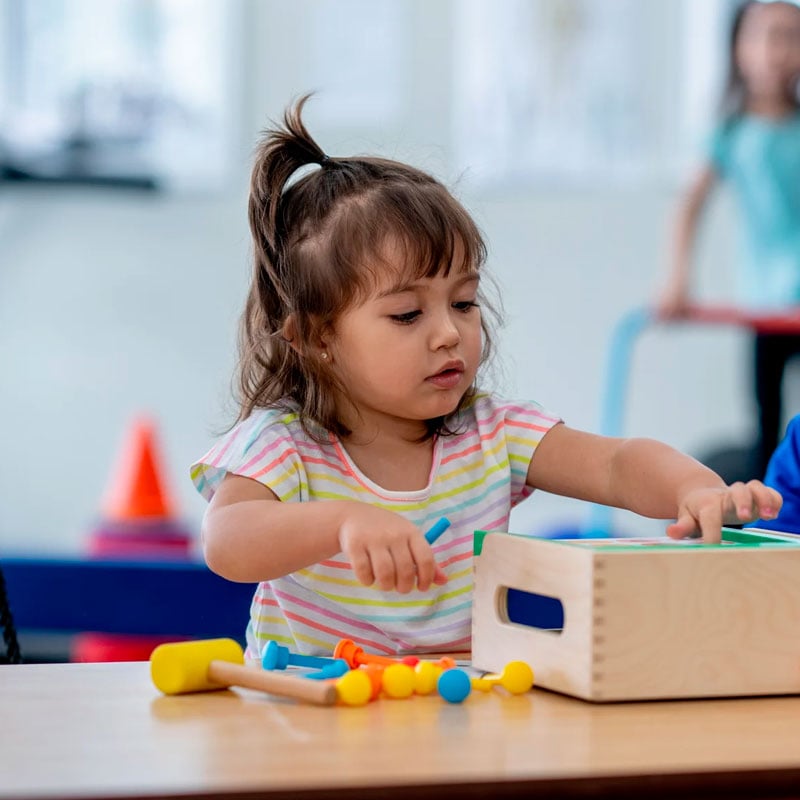Second Year Milestones


In the second year of life, your toddler embarks on a remarkable period of growth and discovery. Let’s explore the key developmental milestones your toddler should reach between 15 months and 24 months of age, and what you can do to support their development in the second year.

Your Toddler’s Milestones at 15 Months Old
Fine and Gross Motor Skills
- Takes a few steps on their own without holding onto furniture
- Starts climbing (or trying to climb) on furniture, playground equipment, etc.
Speech and Language Skills
- Tries to say words for common things like “da” for “dog” or “ca” for “car”
- Looks for familiar objects when you ask for them by name
- Points to ask for something
Cognitive Skills
- Follows simple one-step directions
- Imitates the way you use things like a phone or book
- Stacks small objects like blocks
Social and Emotional Skills
- Claps when excited
- Hugs favorite stuffed toys or dolls
- Gives you hugs and/or kisses to show love
- Copies other children while playing
Feeding Skills
- Can drink from a straw without making a mess
- Moves food from side to side in mouth with tongue

Your Toddler’s Milestones at 18 Months Old
Fine and Gross Motor Skills
- Walks without holding onto anything
- Scribbles with crayons or markers
- Able to climb on and off furniture without help
Speech and Language Skills
- Learns more new words and uses them to share ideas
- Points to show you something they want
Cognitive Skills
- Follows simple directions with one step
- Copies your actions, like chores
- Plays with toys, like making cars drive or feeding baby dolls
Social and Emotional Skills
- Looks at the pages in a book with you
- Makes sure you’re close by when they go explore
- Holds out hands for you to wash
- Helps you dress them
Feeding Skills
- Easily feeds self with fingers or utensils
- Drinks from a small cup with minimal spills
- Enjoys new foods cut into small pieces
Your Toddler’s Milestones at 24 Months Old
Fine and Gross Motor Skills
- Able to run without falling
- Kicks a ball
- Walks up stairs without help
Speech and Language Skills
- Points to pictures in a book when you ask where they are
- Says two words together like “more juice” or “all gone”
- Points out a few body parts when you ask, like knees or feet
- Nods “yes” or shakes their head “no”
Cognitive Skills
- Holds an object with one hand while using the other hand, such as opening a lid
- Uses the knobs, buttons, or switches on a toy
- Uses toys for imaginative play
Social and Emotional Skills
- Notices when others are sad and may try to offer comfort
- Looks at you to see how to react in new situations
Feeding Skills
- Consistently chews food on both sides of mouth
- Can chew and swallow without spilling
- Enjoys a variety of foods
How to Help Your Toddler Achieve Their Second-Year Milestones
Supporting your toddler’s development during their second year will help them gain the skills they need for lifelong success. Here are some practical tips to help your toddler achieve their second-year milestones:
Encourage Physical Activity
Moving and exploring is important because it gives your toddler the chance to practice their fine and gross motor skills in a safe environment. Let your toddler climb on furniture or age-appropriate toys, play games with them inside and outside, and give them the opportunity to move and explore.
Continue Reading and Singing
Reading and singing lullabies or other songs stimulates language development and introduces your toddler to new sounds and words. Read age-appropriate books, sing songs, and enjoy the time spent together as you give your child the opportunity to learn new words.
Promote Their Independence
As much as you may want to do everything to ensure your toddler is safe and happy, it’s important to give them time to do things on their own. Allow your child to self-feed, encourage them to dress or undress themselves, and give them opportunities to be independent as they practice their key developmental skills.
Facilitate Social Skill Development
Your toddler may be interested in playing with children their own age, which is fantastic. You should give them the chance to play with their peers as this will help them learn early social skills like sharing, taking turns, and empathy.
Let Them Help Around the House
Children learn a lot from imitating you and the other people in their life. By letting them help out when you’re folding clothes, setting the table, or feeding pets, you encourage them to try new things and teach them important social skills.
Don’t Force Them to Clean Their Plate
You should encourage your toddler to eat as much or as little as they want to at mealtimes. The best thing to do is give them options of healthy foods and encourage them to try new foods, but don’t force them to eat all of it. This will help them develop a healthy relationship with food and learn to recognize when they are hungry and when they are full.
Reach Out to Let’s Communicate for Personalized Support
Remember, every child develops at their own pace, and providing a supportive environment can help your toddler thrive. But if your child needs additional support, Let’s Communicate Pediatric Therapy Services is here to help.
Give us a call at (678) 963-0694 to schedule an evaluation today if you’re concerned about your child’s development, and we’ll help empower your child to live a successful and confident life.
